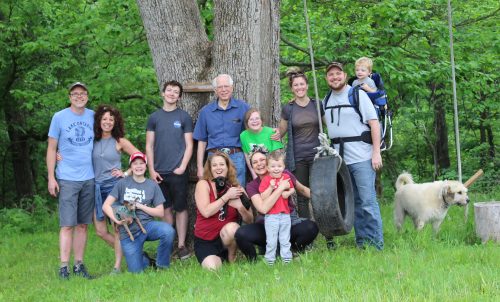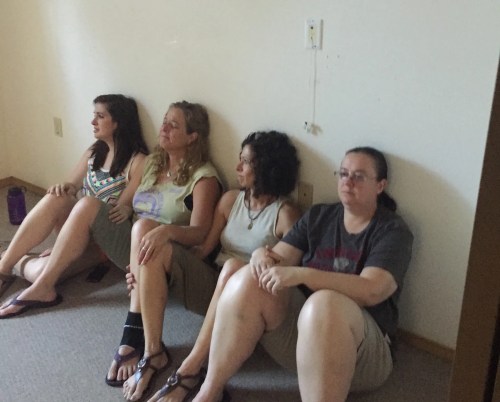It’s morning and I awake, not to an alarm, but to bright sunlight streaming through a crack in my door. I’ve slept so deeply, cradled maternally by my mattress, that the sheets left deep creases on my skin. My consciousness attempts the swim upward through layers of fog. “What day is it?,” I wonder. “Where, exactly, am I?”
With great effort, I roll over and read the digital numbers on the bedside clock: 8:29 a.m. The house is quiet, no one up yet. And then I remember. Two months into summer vacation and today is our first free day — no camp, no summer school, no nothin.’ In a few minutes Sydney and Haley will ransack the kitchen, eating peanut butter out of a jar and reheating chicken nuggets for breakfast like wild monkeys. But I do not care and sink back under the delicious covers.
Child-rearing and chronic fatigue go hand in hand, like hot wings and heartburn.
I love my bed and I’m not ashamed to admit it. Just the thought of my comfy pillow-top soothes my strung-out mind. This bed knows the contour of my body and calls to me seductively, “Lisa, come lie down.” And I do. Whenever possible. In the late afternoon, especially, once I am horizontal, I’m out. “People who nap are lazy,” I used to think, back when I was judgmental and more than a little pious. Back then I had yet to become a mother.
Almost 30 years later, I can’t remember the last time I felt rested. Child-rearing and chronic fatigue go hand in hand, like hot wings and heartburn. As a new mom, sleep-deprivation on the level of Chinese water torture started when my first adorable but very loud newborn arrived and immediately took all nocturnal activities hostage. My initial resistance to being jolted out of an altered state turned to incredulity when I started to realize I would be sleep-walking through life long after 3:00 a.m. feedings ceased. The epiphany was driven home after it was too late, after I chose to have more kids at an “advanced maternal age,” thus clinching the deal: I’ll rest when I’m dead.
I can’t remember the last time I felt rested.
Facing this reality is much like processing grief. It comes in five stages: denial, anger, bargaining, depression and, finally, defeat. I mean, acceptance. The stages aren’t always in that order and some resurface frequently. Like bargaining. Especially bargaining. We all know one should never negotiate with terrorists, even if they are tiny.
But in our defense, they’ve worn my husband and I down over the decades, reducing us to desperate acts committed in exhaustion-induced delirium. “Will you lie down with me?” our children beg with big innocent eyes. And we cave, letting them snuggle as we read a story, fighting to keep our eyes open. Then we wake with a start four hours later, fully clothed and drooling. Or worse (much worse), we let them into our bed. That, my friends, is a trap. All angelic with the gossamer eyelashes and the delicate skin, they curl up close, their soft breathing rhythmic and hypnotic. They lure us in and lull us to sleep in the sweetest of embraces. Pure bliss. For about 5 minutes.
The family bed is a myth.
What follows can’t really be called sleep, collapsing into a coma only to be jolted awake by a sharp knee in the shin or a sudden slap across the face. Through the night, they migrate across the bed’s surface, rooting like baby pigs, thrashing and turning, never still for more than a few moments. Heat-seeking, their little feet reach for the nearest body part. The broad expanse of Daddy’s back makes a good target, right between the shoulder blades. By morning, the bed resembles a war zone, the blankets wadded and twisted or in a heap on the floor.
The family bed is a myth. It’s actually more like musical beds. At some point the willingness to do anything for a good night’s sleep overtakes good judgment. Dad often is exiled and, gone in search of a place to land, he ends up downstairs in the guest bed, or on the couch, or in a bunk bed, wedged up against the wall, his 6’3” frame contorting to fit — or not — the twin mattress with twin-sized blanket and the twin sheet that slides over the protective plastic liner. My poor husband is a character from Dr. Seuss’ One Fish, Two Fish, Red Fish, Blue Fish. “Who am I? My name is Ned. I do not like my little bed. This is not good. This is not right. My feet stick out of bed all night.”
He’s been displaced so often the girls refer to our bed as “Mommy’s bed” and frequently hit me up to fill the assumed vacancy.
There’s no going back; parenting is a long-term gig.
I should be grateful that only 50% of my children are difficult sleepers. In each of the two sets, there is one good sleeper. Of the first batch, Melissa was the one, sleeping like a dream and waking up happy and contented. Jeremy, not so much. He put up the good fight at bedtime and woke either hyper or cranky. Constant ear infections caused him to wail in pain for hours. We’d rock all night, both of us drifting off just as the sun came up.
With this second round of kiddos, Sydney’s the piece of cake. The cliché that kids with Down syndrome are good sleepers is true. As a baby she would lean out of my arms and reach toward her crib at nap time. As a teenager she says, “I’m tired. I’m ready for bed, Mom,” and down she goes. Mornings start with a hug and a shy smile and flow from there. Easy.
Haley couldn’t be more opposite. Bedtime drags on interminably: She’s thirsty, her head (throat, foot, bottom) hurts, she doesn’t have the right pillow, she’s too hot, too cold, her nose is stuffed up. She can’t sleep. She can’t stop thinking. She’s excited, she’s sad, she’s needy. “Mommy, I want you,” she says, reaching her arms out, fingers clutching. “I haven’t spent any time with you!” Steven calls her a little tick. Even after she’s down, when cannot count on the respite. She comes stealthily into our room, appearing suddenly at my bedside, her hand like a woodpecker tapping my shoulder. “I had a bad dream,” she whispers loudly. Or she climbs in over us, jostling the bed, worming her way to the middle, and diving between us.
You’re going to be tired for a while.
Though our older children eventually grew out of sleep disturbances, my weariness remained; the cause merely shifted. Teething and nightmares and the sudden onset of stomach flu at 1 a.m. morphed into loud music and late-night phone conversations and the unbidden images of worst-case scenarios 30 minutes past curfew. Anxiety and stress and overwhelm continued to plague my dreams as they became adults and headed into the wide world. Now, they’re having babies of their own; more worry to steal my sleep. There’s no going back; parenting is a long-term gig.
Coffee is my salvation in the morning and a glass of wine in the evening is my reward for making it through the day, but the cycle can lead to insomnia, the most maddening affliction. When the children are finally sleeping, I lie wide awake, completely and utterly spent, yet unable to let go. And if I’m perfectly honest, there is, as well, the self-induced lack of sleep, the time I carve out of my repose, because, by damn, I must have some to myself! I set my alarm for 4:00 a.m. to teach 5:30 a.m. classes, sacrificing the extra Zs so I can meditate and prepare, unhurried and in peace. I stay up until 2:00 or 3:00 a.m. to write, because the house is quiet then and I am, at last, alone.
This is my life. The one I chose. The one I love.
The other day I ran across my old journals from the mid to late-80s. Steven pulled down a few dusty boxes from the attic and as I paged through entries written by my much younger self, I was intrigued, as if observing someone else’s life. The narrative was passionate with a tendency for the dramatic and the words that emerged repeatedly were, “tired,” “exhausted,” “overwhelmed.” If I could, I would say to that young woman, “Honey, you’re going to be tired for a while – it comes with the job – but you’ll be all right. Take really good care of yourself. It’s crucial if you are to go the distance. Rest when you can. Take naps. It’s not lazy! And remember the love. It will see you through. Sometimes, you’ll just be tired. And that’s okay. It will all be worth it.”
And it is, even though I’m still tired, falling asleep at rock concerts, stop lights and in front of the TV. Nodding off at movies, kids’ concerts and even at weddings. I pass out while reading before bed, mouth open, glasses on, and half-wake to my husband tenderly taking my book off my chest, my glasses off my face and, after placing a kiss on my cheek, turning off the light. I’m still tired, but I start most days feeling energetic and hopeful. The demands of our busy family leave me running on empty by afternoon and it’s just the way of it. This is my life. The one I chose. The one I love.
It will be worth it.
Haley said it best: “In the morning you’re ‘Happy Mommy.’ In the evening you’re ‘Tired Mommy’ because we accidentally exhaust you.” I know the little (and big) people I’ve birthed don’t mean to wear me out, they just need me. Which is an amazing feeling. I’m the mom, and if all it takes is a nap to turn me from Tired Mommy to Happy Mommy, fetch me my pillow.
Like this:
Like Loading...









